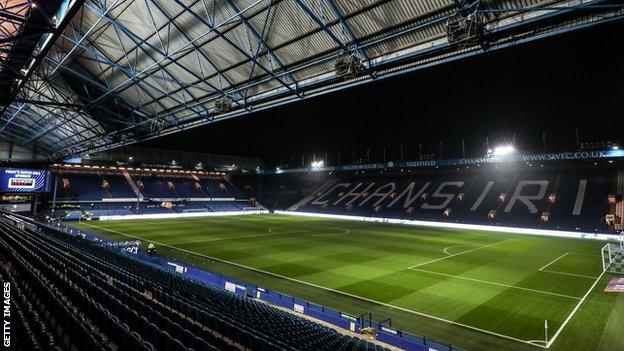Sheffield Wednesday: Owner Dejphon Chansiri buys Hillsborough to ensure club makes profit
- Published

Dejphon Chansiri bought Sheffield Wednesday in 2015
Sheffield Wednesday sold their Hillsborough stadium for about £60m to owner Dejphon Chansiri to try to ensure they did not breach spending rules.
Sheffield Wednesday Football Club Limited sold the ground for a profit of more than £38m, helping them record a pre-tax profit of £2.5m for 2017-18.
The accounts say, external an "income" of £61.2m is to come from "related parties".
Chansiri, their only active director, had previously said the club broke financial rules by "eight figures".
Without the sale of the ground, Wednesday would have posted a pre-tax loss of £35.4m.
Thai-owner Chansiri, who in June set up a new parent company - Sheffield Wednesday Holdings Limited - registered in Hong Kong, said in December 2018 that he was putting the club up for sale and admitted they had "problems" with the English Football League's profitability and sustainability rules (previously known as financial fair play, or FFP).
Both Derby County and Aston Villa have also sold their stadiums to their owners, who in turn have leased them back to their respective clubs, in recent months to help meet the spending rules.
With information on Hillsborough at the Land Registry showing the ground is still registered to the Championship club, football finance expert Kieran Maguire from the University of Liverpool said Wednesday should "clarify the situation".
He told BBC Radio Sheffield: "Wednesday needed to sell Hillsborough as they certainly would have breached financial fair play (rules) and been subject to a points penalty."
Spending rules in the Championship allow clubs to lose as much as £39m over three years. In the previous two years, the Owls recorded combined pre-tax losses of more than £30.5m.
Birmingham City were deducted nine points by the EFL last season for breaching profitability and sustainability rules.
Analysis
Mike McCarthy, BBC Radio Sheffield
There are some confusing things about the sale. I've asked Sheffield Wednesday when exactly it took place and they haven't been able to tell me. That immediately sets off some alarm bells.
In December, Mr Chansiri told a fans forum the club had broken the financial rules by an eight-figure sum - so at least £10m. Now for the same accounting period, Wednesday are showing a profit.
So if the ground had already been sold, or a contract was in place to sell it, why didn't Sheffield Wednesday tell anyone about it at that fans forum and put fans' minds at ease?
And why does the land registry still show Sheffield Wednesday as the owners of Hillsborough if it was sold months, possibly years ago?
Already we understand Sheffield Wednesday are working under a soft transfer embargo - that means they can sign some players, but they can't go big on transfer fees or wages.
And, long term, selling the stadium doesn't help much. You can only do it once, and that means Sheffield Wednesday's next accounts are likely to show another big loss. Without the stadium sale they'd have lost £35m this time.
So they still have to cut costs, and that has begun this summer with the release of half a dozen players from the first-team squad. But there's probably a lot more work to do.